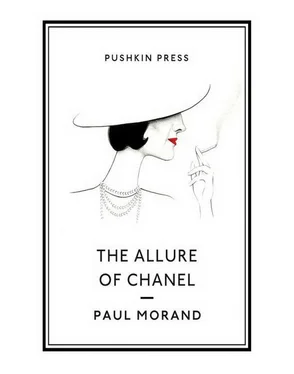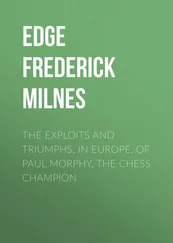Now here they are grooming themselves at table! They place a gold vanity case, the weight of an ingot, beside their plate and they use their napkin to apply make up. They put their comb next to their fork. There are blond hairs in the soup. They think their lipstick is a strawberry. They sprinkle the white sauce with ochre. When I see them being served with an escalope, I wonder whether it’s to eat or to put on their cheeks.
And in bed! Look at them with their faces covered in black grease that dirties the pillow, with their curlers and their chin supports, and oil on their eyelids. Poor husband! Since she has captured him, it’s pointless now to make herself attractive to him; she wants to be attractive to others, those she sees during the daytime, who do not interest her, or who only excite her in so far as they couldn’t care less about her. Women are in love with fashion; they would never sacrifice a lover for it. Everybody says to me: “How lucky! You don’t put on red nail varnish!” No woman, on hearing that, wants to please them and not use it any more.
Here they are, doomed to the humiliation of having to make advances. Their foot seeks a man’s foot beneath the table, and they’re only too glad if the foot is not withdrawn. And they complain about not being loved! With their vain chatter, they trap the man into a dilemma: if he’s a well-brought-up, reserved man, they will say: “He’s a queer.” And if he takes any notice of them: “He pounced on me.” If women who ought to be giving an example behave like this, think of the others. (Well, the others, fortunately, behave rather better.)
I’ve never known a man who succeeds because of women. On the other hand, I’ve known many who have been ruined by women. For many men are judged, unjustly what’s more, by their wives. Wives hamper their husbands’ careers more often than they further them.
There are many ways of betraying a man and very few ways of deceiving him: foolish or reckless purchases, behaving idiotically, personal hatreds to do with vanity, having bad breath or a poor education. (Whereas deceiving has only one meaning = the carnal sense.) You betray a man by remaining silent at table, like an ass, and by allowing the atmosphere to freeze; you betray him, too, by reciting a few lines you have learnt for the dinner party. By not being in fashion; or by being too much so, by driving lorries, by dressing in printed cotton fabrics, by speaking the jargon of the day: “getting round someone”, “to have had it up to there”, “OK”, “great”, etc. So many women put the man they love in a position of inferiority.
I’m not even talking about the very young, who have an excuse, but about older women, they are the worst. Why do all these former beauties age so badly?
The things they manage to say in front of their husbands defy the imagination: C, the most delightful, the most attractive of our writers, was admiring a statue in my garden.
“How beautiful and restful that character is,” he said.
“Have it. I’ll give it to you.”
“Where are you going to put that?” his wife fumes. “We’ll have to move house!”
Embarrassed, he replies:
“I would never take it, but it moves me so …”
(The following day, it is she who comes to take it away.)
“I am happy to give it to you,” I say, “because I admire you.”
“Oh!” the missus replies in a fury. “If you will pay him compliments!”
Now listen to the wife of a well-known doctor; they are talking about how the professor spends his time:
“On Tuesday … consultation. On Wednesday … lecture at the faculty. On Thursday … ah! Thursdays are put aside for love. And I can assure you that the professor does not get bored!”
And now listen to the wife of an industrialist:
“So you think this dress doesn’t suit me! I dress badly, no doubt?” (Beginning of the scene, at dinner.)
“One sees too much of your thighs …” replies M Mathis.
“Do you dare to suggest that you don’t like my thighs?
They’ve served you well enough, those thighs!”
All these remarks were overheard on the spot. And they come from the mouths of some of the most prominent women in Paris (none of whom, fortunately for Paris, is a Parisienne. And they’re not children, they’re people in their fifties!)
I am much more frightened of a woman than I am of a man.
There is also the opposite extreme, which is worse, the scholarly woman, the poetess, the politicised woman.
I prefer a woman who likes blacks to a woman who likes academicians.
The only two female writers who appeal to me are Madame de Noailles and Colette. The Comtesse wanted to dazzle me. She dressed like Cocteau and Cocteau wrote like Anna. She did not eat at table, for fear that she would be interrupted; and when she drank, it was the speaker’s glass she held; she would make a gesture with her hand that her sentence was not finished. She looked into my eyes whenever she spoke to me, which pleased me. What is more, I was the only person to recognise that what she said was intelligent.
I like Colette, with her apostle’s feet and her accent. But she is wrong to allow herself to get fat. This highly intelligent woman has not understood that it is important to look after yourself. She brags about her greediness. Two sausages would be enough for her; two dozen is affectation. She wanted to astonish Saint-Tropez. And the more embarrassed she felt about her portliness, the more she exaggerated it. Had I been intelligent (and all the more so, had I been an intellectual) I would have been lost; my incomprehension, my desire not to listen, my blinkers, my stubbornness, have been the true causes of my success.
Women never amuse me. I feel no friendship for them. (What is more they don’t know what it means.) In France, in any case, friendship is a challenge.
The word ‘honour’ has no meaning for women.
They don’t play the game, but they expect it to be played with them.
Couples are the worst.
You can like them individually; together, they are detestable. As for being the friend to both of them, it’s like squaring the circle. The couple is an association; an association, ‘unity is strength’, is tiresome because it is useful. Love should be an organisation for mutual extermination and not a charity. It’s just as difficult to witness complicity in a couple as it is dissension. The couple never stop to think of the intolerable position of a third party; a couple is never straightforward, generous and spontaneous; it is nothing but reflection, scheming and selfishness. It’s inhuman: it’s an artificial creation, a corporation. Even if the couple loathe one another, they unite against you; it’s like one of those serrated wheels that bite into one another, but make the machine function better.
But fortunately “the woman is not always the female of the male; there can be two completely dissimilar people in a household”. It was Balzac who said that; it’s comforting. Marie Laurencin used to say: “I detest that third person who is known as the Couple.”
Boy Capel would often say to me:
“Remember that you’re a woman …”
All too often I forget that.
So as to remind myself, I stand in front of a mirror: I see myself with my two menacing arched eyebrows, my nostrils that are as wide as those of a mare, my hair that is blacker than the devil, my mouth that is like a crevice out of which pours a heart that is irritable but unselfish; crowning all that, a great knot of schoolgirl’s hair set above the troubled face of a woman who spent too much time at school! My dark, gipsy-like skin that makes my teeth and my pearls look twice as white; my body, as dry as a vine-stock without grapes; my worker’s hands with cabochons that resemble an imitation American knuckle-duster.
Читать дальше












